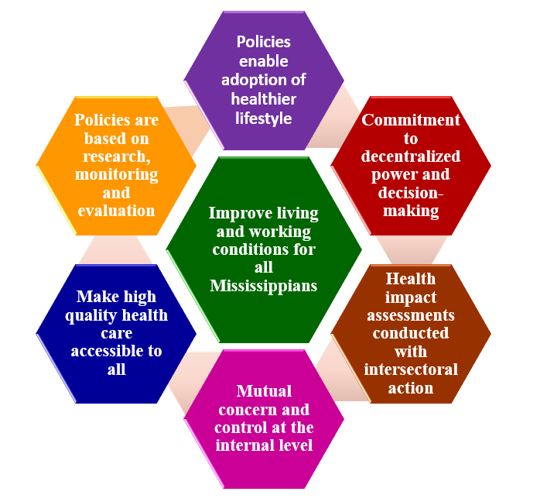The Health Disparities arm of MSDH is committed to addressing inequalities in the processes, policies, and procedures of all MSDH programs.
Mission, Vision, and Guiding Principles
Mission
To promote equal social, economic, and environmental conditions to create a culture of optimal health and well-being for all Mississippians. Establish systems to enable MSDH staff to apply goals and values with equal opportunity when developing policies, procedures, services, and plans with the aim of reducing inequalities and disparities in healthy status based on race, ethnicity, and linguistic ability to improve the quality of health for all Mississippi residents.
Vision
To be a champion for achieving optimal health for all Mississippians.

Focus Areas
- All MSDH policies and system changes will work to promote optimal health.
- A commitment to optimal health should be evident in all critical documents, strategic plans, and permanent structures associated with the agency.
The Mississippi State Department of Health will:
- continually assess how well it provides cultural and linguistically appropriate services (CLAS).
- support the ability of individuals to communicate their own intentions and motivations in a style of their own choosing.
- track all health disparity-related activities.
- Timely and accurate data is important to addressing health disparities in Mississippi.
- The goal of The MSDH is to disseminate data which increases awareness of health disparities within the state.
- This data will:
- assist staff, as well as key stakeholders, in identifying gaps in services and programs.
- help inform policy makers about available resources and the need to improve health in Mississippi.
- The ability of public health and healthcare workforces to reduce health disparities and improve health outcomes will depend on overall levels of cultural competency and disparity awareness within organizations.
- The MSDH will:
- offer continuing education and training on essential topics (e.g., Title VI of the Civil Rights Act, National CLAS Standards, and Cultural Competence Training).
- provide a clear understanding of the difference between health disparities and health inequalities.
- The process of improving health outcomes will be enabled by building and supporting diverse/skilled public health and healthcare workforces.
- Fostering long-standing relationships between MSDH programs and organizations that serve/work with communities will be central to our success.
- These partnerships are/will be mutually beneficial and facilitate greater understanding of various populations found within the state.
- Identifying, connecting, and interacting with populations that have greater need(s) will allow tailored programs to be created aimed at addressing community-specific health disparity issues.
Reach our Health Disparities team at 601‑206‑1050.

